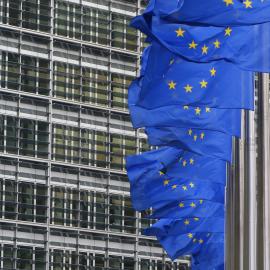To the Editor:
Philip H. Gordon's excellent commentary on the EU plan for a unified military force ("Their Own Army?" July/August 2000) examines a range of unintended and unwelcome possible consequences.
Americans know well that their European friends have long been simultaneously pushed and pulled by ambivalent U.S. attitudes toward European integration and the self-assertion that it implies. The U.S. Defense and State Departments openly or privately denigrate European efforts, and with a very powerful, Euroskeptical, unilateralist Congress, the Europeans are generally (and not surprisingly) intimidated by American megapower.
Washington sees Europe's own divisions all too well. Paris, London, Berlin, and other capitals have different priorities and orientations. Even those who wish European integration well worry whether its leaders will have the political guts to face down American distrust and intimidation. Combined with those U.S. policymakers who for geostrategic and geoeconomic reasons do not want a healthy European competitor, the resulting American pressure demands a new generation of European leaders willing to take risks and ask their peoples for uneasy tradeoffs -- in short, leaders who will push back against Washington. Establishing a unified European defense force will not necessarily require another de Gaulle. But it will require a generation of leaders willing to stand up even to allies.
European self-assertion, unfortunately, will in certain respects appear to be anti-American, as threatening to American interests if not to American security. Not all Americans will think this way, but those wedded to a view of the Europeans as troublemakers, free riders, and shifty partners certainly will.
Thus the next phase of European-American relations will require especially wise and liberal presidential leadership in Washington. If the Europeans are successful at continued renaissance, which is in the U.S. interest and which the U.S. should want for its friends and allies, the next administration must be prepared to explain to Americans and justify to a sincerely incredulous Congress how and why the post-World War II American intimidation of Europe, intended or not, must be consciously wound down. A better transatlantic equilibrium will ensure that the United States does not become an overpowerful, resented leviathan, as strong and influential as it is fragile and isolated.
A unified European defense force must be constructed not only in Europe but also in Washington.
Ronald Tiersky
Professor of Politics, Amherst College
